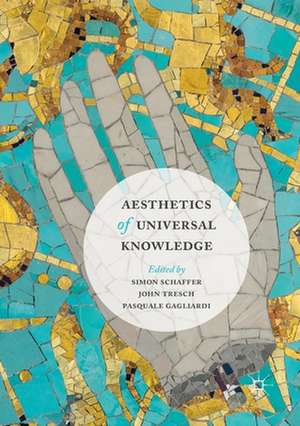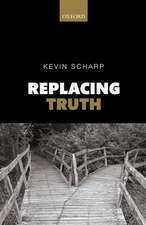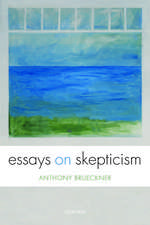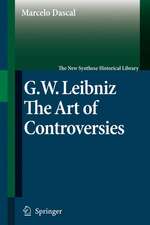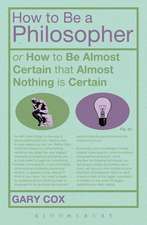Aesthetics of Universal Knowledge
Editat de Simon Schaffer, John Tresch, Pasquale Gagliardien Limba Engleză Paperback – 22 iun 2018
Born out of a major international dialogue held at the Fondazione Giorgio Cini in Venice, Italy, this collection of essays presents innovative and provocative arguments about the claims of universal knowledge schemes and the different aesthetic and material forms in which such claims have been made and executed. Contributors take a close look at everything from religious pilgrimages, museums, and maps of the world, to search engines and automated GPS.
Current obsessions in information technology, communications theory, and digital culture often concern the value and possibility of a grand accumulation of universally accessible forms of knowledge: total libraries, open data bases, ubiquitous computing, and ‘smart’ technologies. These obsessions have important social and philosophical origins, and they raise profound questions about the very nature of knowledge and its organization. This volume’s contributors draw on the histories of maps and of encyclopedias, worldviews and visionary collections, to make sense of the crucial relation between the way the world is known and how it might be displayed and transformed.
| Toate formatele și edițiile | Preț | Express |
|---|---|---|
| Paperback (1) | 887.86 lei 6-8 săpt. | |
| Springer International Publishing – 22 iun 2018 | 887.86 lei 6-8 săpt. | |
| Hardback (1) | 893.05 lei 6-8 săpt. | |
| Springer International Publishing – 24 mai 2017 | 893.05 lei 6-8 săpt. |
Preț: 887.86 lei
Preț vechi: 1082.76 lei
-18% Nou
Puncte Express: 1332
Preț estimativ în valută:
169.89€ • 177.38$ • 140.61£
169.89€ • 177.38$ • 140.61£
Carte tipărită la comandă
Livrare economică 04-18 aprilie
Preluare comenzi: 021 569.72.76
Specificații
ISBN-13: 9783319826158
ISBN-10: 3319826158
Pagini: 271
Ilustrații: XXI, 271 p. 57 illus., 32 illus. in color.
Dimensiuni: 148 x 210 mm
Greutate: 0.35 kg
Ediția:Softcover reprint of the original 1st ed. 2017
Editura: Springer International Publishing
Colecția Palgrave Macmillan
Locul publicării:Cham, Switzerland
ISBN-10: 3319826158
Pagini: 271
Ilustrații: XXI, 271 p. 57 illus., 32 illus. in color.
Dimensiuni: 148 x 210 mm
Greutate: 0.35 kg
Ediția:Softcover reprint of the original 1st ed. 2017
Editura: Springer International Publishing
Colecția Palgrave Macmillan
Locul publicării:Cham, Switzerland
Cuprins
Preface: Text And Context: Genius Loci; Pasquale Gagliardi.- Introduction; Simon Schaffer.- Part I. Visions.- 1. Re-Visioning The World: Mapping The Lithosphere; Adam Lowe And Jerry Brotton.- 2. Architects Of Knowledge; Pierre Chabard.- 3. Pictorialism (Prelude & Fugue); Cheryce Von Xylander.- 4. The Unending Quantity Of Objects: An Observation On Museums And Their Presentation Modes; Anke Te Heesen.- Part II. Worlds.- 5. Cosmopragmatics And Petabytes; John Tresch.- 6. Gaia Without The Sphere; Bruno Latour.- 7. Mapping Dark Matter And The Venice Paradox; David Turnbull.- Part III. Economies.- 8. The Web, Google And Cosmograms; Steve Crossan.- 9. Rhetoric, Economics, And Nature; Deirdre N. Mccloskey.- 10. Lodestar; Richard Powers.
Notă biografică
Simon Schaffer is Professor of History of Science at the University of Cambridge, UK. He is the author of La fabrique des sciences modernes and the coeditor of The Material Cultures of Enlightenment Arts and Sciences.
John Tresch is Associate Professor of History and Sociology of Science at the University of Pennsylvania, USA. He is the author of The Romantic Machine: Utopian Science and Technology after Napoleon, among other works.
Pasquale Gagliardi, former Professor of Sociology of Organizations at the Catholic University of Milan, Italy, is now Secretary General of the Giorgio Cini Foundation in Venice, Italy. He is the author of Symbols & Artifacts. Views of the Corporate Landscape and Le imprese come culture, among other books.
Textul de pe ultima copertă
Born out of a major international dialogue held at the Fondazione Giorgio Cini in Venice, Italy, this collection of essays presents innovative and provocative arguments about the claims of universal knowledge schemes and the different aesthetic and material forms in which such claims have been made and executed. Contributors take a close look at everything from religious pilgrimages, museums, and maps of the world, to search engines and automated GPS.
Current obsessions in information technology, communications theory, and digital culture often concern the value and possibility of a grand accumulation of universally accessible forms of knowledge: total libraries, open data bases, ubiquitous computing, and ‘smart’ technologies. These obsessions have important social and philosophical origins, and they raise profound questions about the very nature of knowledge and its organization. This volume’s contributors draw on the histories of maps and of encyclopedias, worldviews and visionary collections, to make sense of the crucial relation between the way the world is known and how it might be displayed and transformed.
Caracteristici
Offers a very interdisciplinary approach, bringing together philosophers, historians, anthropologists, sociologists, technical experts, and artists. Includes illustrative visuals. Confronts central questions of today’s global condition: What are the technologies, myths, and aesthetic styles for depicting and realizing knowledge of the universe and universal knowledge.
